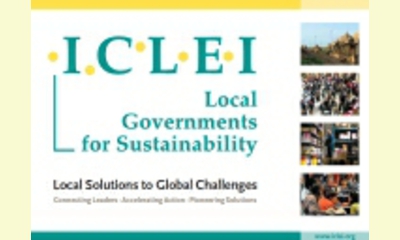|
|
ICLEI’s evaluation of the outcomes of Rio+20
un article par ICLEI (Local Govenments for Sustainability)
. . . We had hoped that the Rio+20 summit would result in decisions by the governments assembled in Rio which would trigger the development of an inclusive, green economy and establish a global institutional architecture endowed with competencies and powers that would ensure the safeguarding of human living conditions and ecosystems services.

click on photo to enlarge
We now see that all the good will, energy, brain capacity and money that went into the Rio+20 process have resulted in dozens of pages of paper, which contain hardly any commitment by governments. Instead, national governments reaffirm what they had already resolved long ago, list non-binding intentions, and acknowledge the activities by other actors such as local governments.
It remains unclear who should be in charge and accountable for taking decisions on the transformative actions needed, and for rapid implementation.
Do cities have to step in where governments are failing to take effective action? Cities are cooperating internationally without borders, without customs, without military forces. They can address the issues of the future without the global power play that we see going on at intergovernmental level. We have once more seen governments defending national interests rather than working together on a common global agenda. We suspect that the mechanisms, rules and routines of international diplomacy are outdated and incapable of designing and bringing about a sustainable future.
Will the United Nations want to include local governments in the mechanism of decision shaping and even decision making, or shall local governments create their own voluntary institutional frameworks for commitments and accountability? They have actually started doing so. Twenty years ago, with Agenda 21 being adopted by the Heads of States and Governments at the Rio Earth Summit, Local Agenda 21 was spearheaded by ICLEI and may be regarded as a global success story of moving towards sustainability. In contrast, not many countries can demonstrate a national success story of having implemented a national Agenda 21. Similarly, it took nations 13 years to get from the adoption of the UN Framework Convention on Climate Change to the entry into force of the rules for implementation, the Kyoto Protocol. In contrast, it took local governments only 8 months until ICLEI convened the first municipal leaders summit on climate change and initiated the Cities for Climate Protection Campaign which involved about thousand local governments in local climate action planning. In 2010, Mayors signed the Global Cities Covenant on Climate (Mexico City Pact), committed to voluntary climate action and accountability, and established the Carbon Cities Climate Registry as a global reporting platform. In 2011, Mayors signed the Durban Adaptation Charter, thereby making commitments to climate change adaptation action . . .
|








|
DISCUSSION
Question(s) liée(s) à cet article:
Can cities take the lead for sustainable development?,
* * * * *
Commentaire le plus récent:
This discussion question applies to the following articles:
Aguascalientes, Mexico: City Council to Support Sustainable Developmen
Aguascalientes [México]: Conforma el Ayuntamiento Agenda 21 para el Desarrollo Sustentable
ICLEI’s evaluation of the outcomes of Rio+20
Cities High on the Agenda at Major Conservation Gathering
UN-Habitat and ICLEI unveil the EcoMobility World Festival
ICLEI World Congress: Sustainable Solutions for an Urban Future
ICLEI Declaration to the Ministers at COP21, Paris, France
Latin American mayors meet in Costa Rica for development goals

|
|









